Did you know that the cost to prepare taxes can vary dramatically depending on your situation? The average tax preparation cost for a basic tax filing is about $220, but this is just the starting point.
Surprisingly, tax preparer fees can increase to anywhere from $300 to $600 or more for complex tax situations. In fact, individuals whose returns required multiple schedules paid an average total fee of $778. The average cost of tax preparation by a cpa for a Form 1040 with Schedule A and a state income tax return was a flat fee of $323.
However, these prices aren't set in stone. More than half of American taxpayers seek professional help with their tax returns, and what you'll pay to get your taxes done depends on several factors: the complexity of your situation, your location, and even when you file. For instance, CPAs and EAs might charge between $150 and $400 per hour, while regional differences can significantly affect the cost.
This comprehensive guide breaks down exactly what you can expect to pay for tax preparation in 2025, helping you avoid hidden fees and find the service that's right for your needs and budget.
Tax preparation fees have been steadily increasing, with 90% of surveyed accounting firms planning to raise their rates for individual tax returns in 2025. Understanding these costs can help you budget accordingly and choose the right tax preparation option for your needs.
The national average for tax preparation by CPAs in 2025 varies based on the complexity of the return. For simple tax returns with standard deductions, expect to pay between $200-$300. Moderately complex returns involving itemized deductions or multiple income sources typically cost $400-$600. Furthermore, complex returns that include self-employment income, rental properties, or foreign income reporting can cost anywhere from $800-$1,500 or more.
According to recent projections, the average minimum rate that accounting firms in New York state expect to charge for personal tax preparation services in 2025 is approximately $200-$300 for simple returns. Nearly half of firms surveyed (49%) charge $400-$799 for basic individual tax return services.
Tax preparation costs can vary widely depending on the complexity of your return and the type of tax filer you are – whether an individual, sole proprietor, or business entity.
Here's a general breakdown of what individuals can expect to pay for professional tax preparation services in 2025:
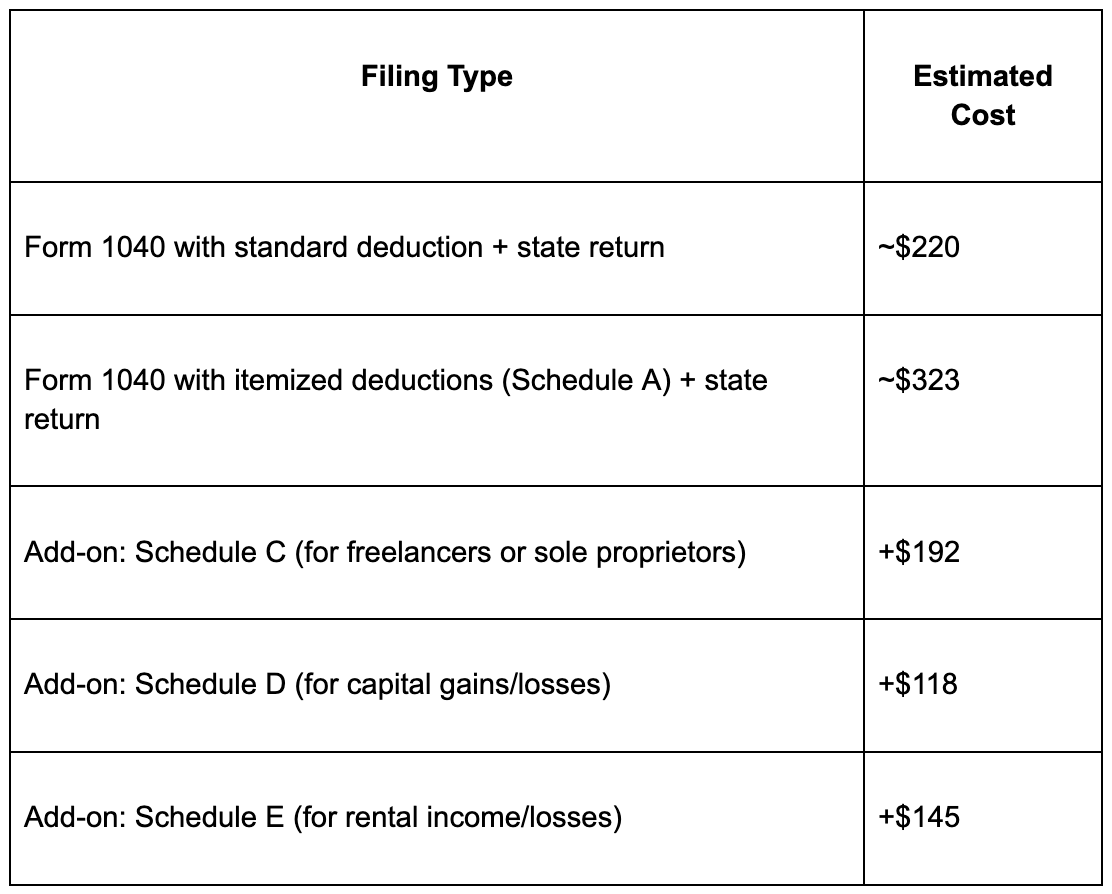
The more tax forms you need and schedules your return requires, the more your costs will increase. For example, someone with W-2 income and no deductions might pay under $250, while a freelancer with rental properties and investment income could easily cross $600–$700.
Business returns are more complex and typically come with higher fees. In 2025, here's what small business tax preparation can expect:
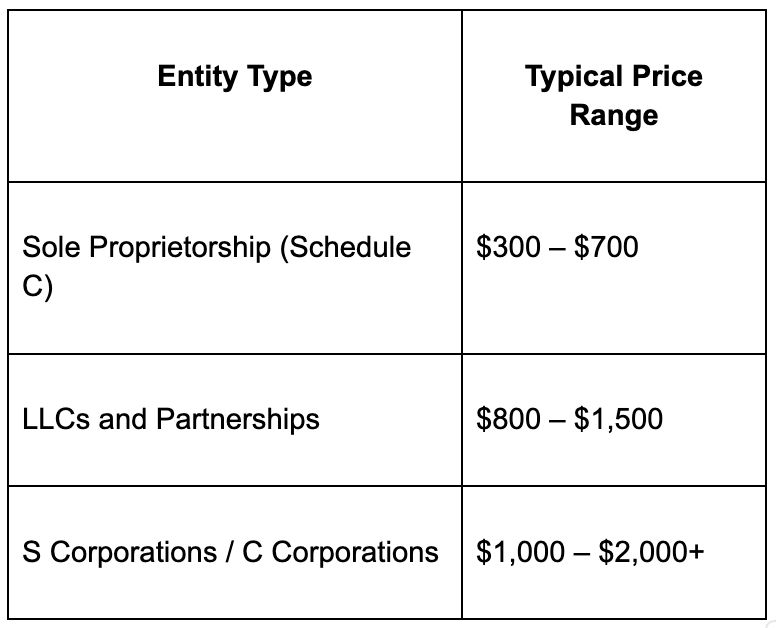
At smaller CPA firms, the floor for returns is even higher:
There's no one-size-fits-all pricing model in tax prep. A 2021 industry survey showed that tax professionals use a mix of:
So whether you're an individual filer or a growing business, it's smart to ask your tax pro how they calculate fees, not just how much.
Your location significantly impacts what you'll pay for tax preparation. Urban areas with higher living costs generally charge more than rural locations. For example, a tax preparer in New York City will likely charge more than one in a rural Midwestern town.
In California, a tax accountant may charge upwards of $300 for basic tax return preparation, whereas someone in a smaller Midwestern town might only charge $150. Moreover, certain states with more complex tax regulations may lead to higher preparation costs.
Tax professionals in metropolitan areas may charge premium rates due to higher operational costs and demand. Consequently, the same tax return might cost 30-50% more in a major city compared to a rural area.
While base rates give a general idea, the actual cost of preparing your taxes often depends on several underlying factors. Understanding these can help you plan ahead, ask smarter questions, and even save money on your return.
This is the biggest driver of cost, and for good reason. The complexity of the tax situation determines how much time and expertise your tax preparer needs to devote when they prepare your return.
Here are a few scenarios that significantly raise the complexity:
Multiple income streams: If you earn income from wages, self-employment, rental properties, AND investments, your return requires multiple forms and schedules – each adding more to the workload.
Itemized deductions vs. standard deduction: Claiming deductions for mortgage interest, large medical bills, or charitable donations involves documentation and strategic knowledge that standard deductions don't require.
Business or property ownership: If you run a small business, own rental units, or manage significant investments, you'll likely need to file Schedules C, E, or D – all of which take more time and precision.
Employment changes: If you switched between freelance and W-2 employment during the year, your return gets more complicated. Tax rules differ for each income type, and transitions can impact withholding, deductions, and self-employment tax.
The more moving parts in your return, the higher the cost, because your preparer needs to untangle it all, ensure compliance with tax authorities, and look for tax-saving opportunities.
Here's something that surprises many taxpayers: being disorganized costs you. In fact, surveys show that nearly 75% of tax professionals increase their fees – by an average of $145 – when clients show up with incomplete or messy paperwork.
If your tax documents are:
…your preparer will need to sort, clarify, and possibly follow up – all of which increases the time it will take to prepare your return (and your fee). On the flip side, submitting clean, organized files – ideally digital – makes the process faster and more affordable.
Pro tip: Categorize your receipts, scan key docs, and keep a running tax folder throughout the year. It's one of the easiest ways to save on tax prep.
When you choose to file affects what you pay. Like airfare or hotel rates, tax prep costs often rise closer to the deadline.
During March and early April, most professionals are overwhelmed with last-minute filings, and many apply rush fees or surge pricing. By contrast, those who submit their materials in January or early February may benefit from "early bird" discounts or at least avoid stress-induced surcharges.
Another reason to start early? You'll have time to fix missing docs, evaluate deductions, and get better tax advice – instead of rushing through decisions at the last minute.
Your zip code affects your tax prep bill more than you might expect.
Tax professionals in major metros like New York, San Francisco, or Boston typically charge more than those in smaller cities or rural towns. That's not just due to demand – it also reflects differences in:
In fact, the same 1040 return might cost 30% to 50% more in a high-cost city than in a more affordable region, even with identical filing requirements. So if you're flexible and don't require in-person help, you may want to consider remote tax professionals in lower-cost areas.
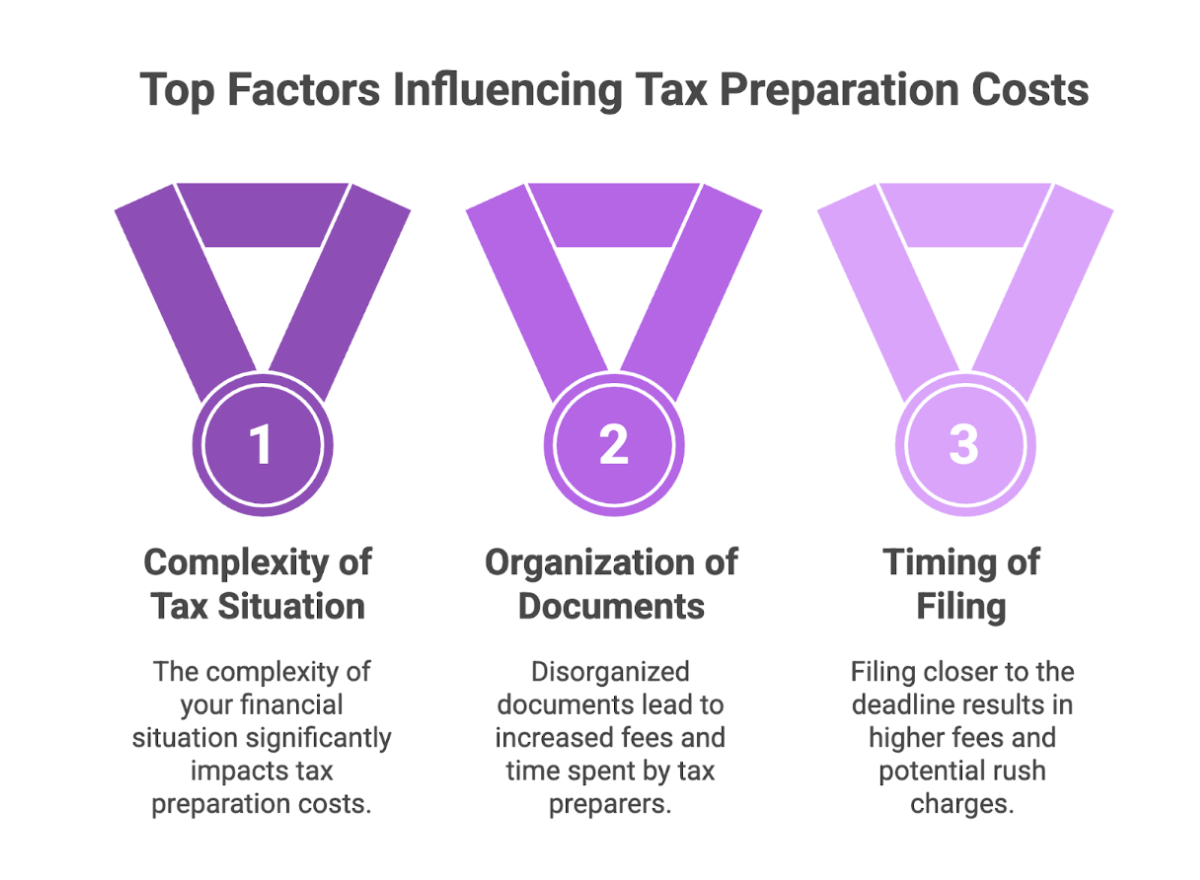
Choosing the right tax preparation method can save you both money and headaches. As tax complexities increase, selecting the appropriate option becomes even more crucial for maximizing your tax advantages.
DIY tax software has become increasingly popular, with approximately 35% of people using TurboTax to file their taxes, while 30% use an accountant. Online tax preparation typically costs between $20-$120 depending on your needs, making it substantially more affordable than professional services.
DIY options work best in straightforward situations:
Professional tax preparation becomes more valuable as your financial life grows more complex. The tax preparation software market was valued at $17.90 billion in 2024, yet many taxpayers still benefit from professional guidance. According to research, experienced tax professionals can often identify deductions and tax strategies that software might miss.
For complex situations (self-employment, multiple income streams, rental properties), the cost difference may be justified by potential tax savings. Professional preparers typically charge $200-$300 for simple returns but $800-$1,500 for complex scenarios with multiple income sources.
Online tax preparation services offer a middle ground between DIY software and traditional CPAs. These services typically provide access to tax professionals at a lower cost than visiting a local CPA office. Nevertheless, local CPAs offer advantages that online services cannot match.
Local CPAs develop personal relationships with clients, understanding their unique financial situations over time. This personalized knowledge often leads to better tax planning and strategic advice. Although tax return preparation with a Schedule A and state return costs about $323, this investment can yield significant tax savings through year-round planning.
Ultimately, the choice depends on your specific needs. If your tax situation involves multiple revenue streams or business income, a local CPA might provide better value despite higher costs. Conversely, if you're comfortable with technology and have relatively simple taxes, online services offer convenience at a lower price point.
In certain situations, specialized tax professionals become necessary. Enrolled agents (EAs) are tax advisors federally licensed to represent you before the IRS. They must either pass a comprehensive three-part exam or have worked with the IRS for five years.
Tax attorneys, meanwhile, are trained and licensed experts specializing in tax law.
While both can represent you before the IRS, they serve different needs:
Enrolled agents are ideal when:
Tax attorneys become necessary when:
The attorney-client privilege represents a significant advantage tax attorneys have over other tax practitioners. While EAs often charge less than tax attorneys, this isn't always the case, some EAs charge fees comparable to or higher than attorneys.
Different types of tax preparation services cater to varying needs and budgets. Understanding these options helps you choose the most appropriate service based on the complexity of the tax situation you're facing.
Madras Accountancy offers small and mid-sized CPA firms in the U.S. a smarter route to growth with Outsourced Tax, Audit, Accounting and CAAS services. Our highly trained and experienced offshore teams in India, backed by our robust and intuitive processes are equipped to handle everything from routine tasks to complex processes with accuracy, efficiency and reliability, while reducing your overheads to less than 40%.
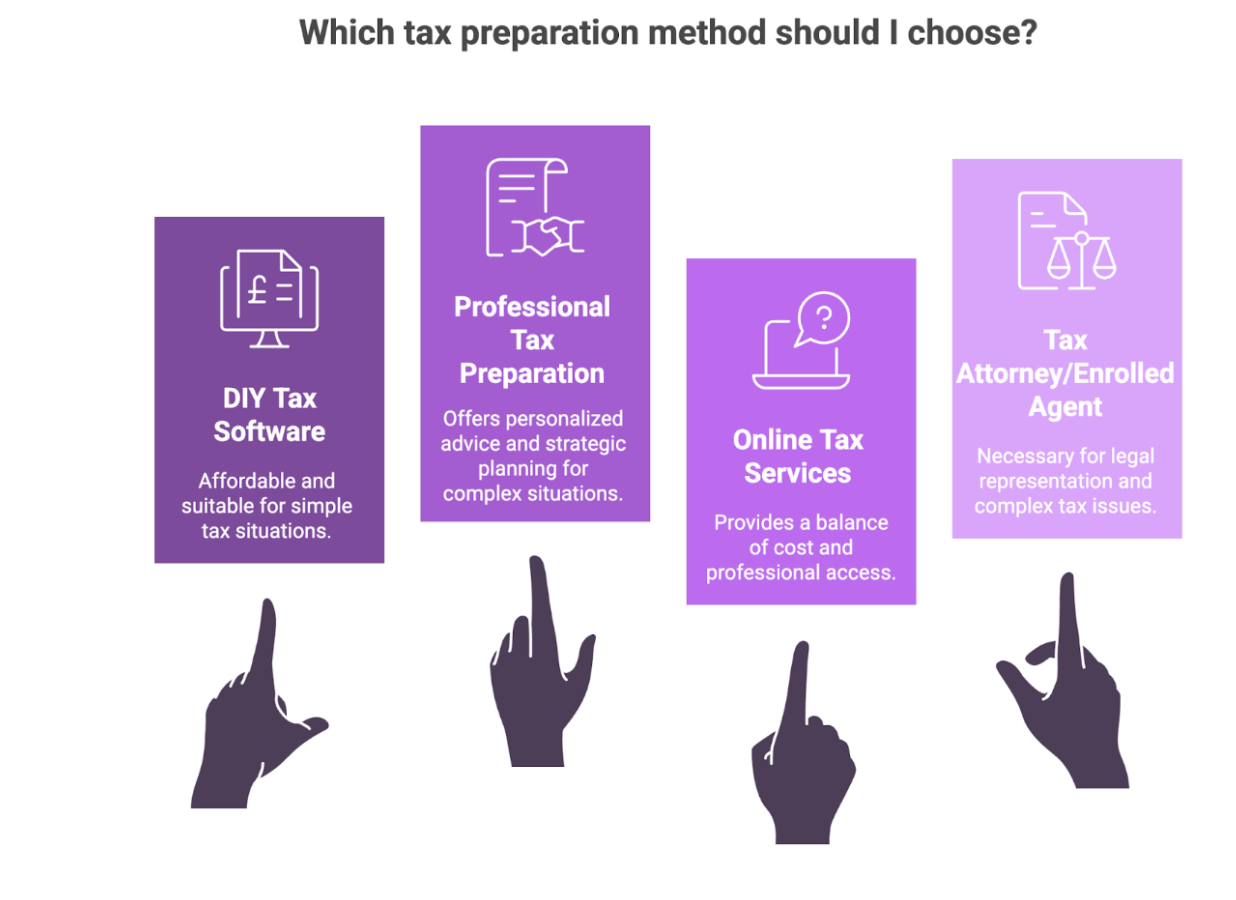
Understanding how tax professionals set their prices can help you avoid surprises – and choose the right service based on your needs. While fee structures vary, most firms use one (or a mix) of three models: flat fees, hourly billing, or per-form pricing. Some also offer bundled services or retainers, especially for business clients.
Let's break down each.
These are the two most common ways individual tax preparers charge – and both have pros and cons based on the complexity of your return.
Flat Fees: Many preparers offer a flat rate that covers the full scope of your tax return: federal and state filings, a basic consultation, and document submission. The advantage? You know your cost upfront – which helps with budgeting and peace of mind.
Typical ranges:
Some preparers might charge a flat fee regardless of how long it takes, which is best if your tax situation is predictable and your documentation is organized.
Hourly Billing: Some CPAs and tax attorneys charge by the hour, especially for complex or evolving cases. The average tax preparer hourly rates usually range from $100 to $200, though top-tier professionals in major metros may charge $250 to $500+ per hour.
This model makes sense when:
The downside? You won't know your final bill until the work is complete, which can be stressful or risky if you're on a tight budget.
This is one of the most transparent billing models, and the most common, used by most of tax preparers.
Each form or schedule comes with its own fixed price. Here's a rough guide to what you can expect:
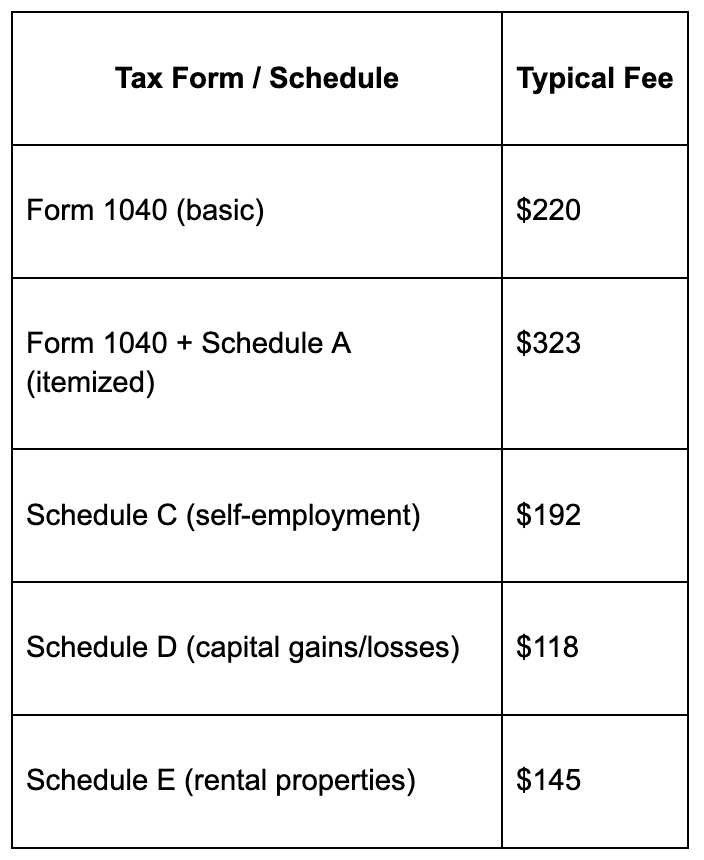
This model gives you clarity: You only pay for what you actually need. It's ideal for filers with a few known complexities who want to track how each piece contributes to the total cost.
If you're running a business, chances are your needs go beyond one annual tax return. That's where bundled service plans and retainers come in.
Bundled Services: These packages combine tax prep with other ongoing services like:
These are often priced monthly, starting around $129 to $179/month for solopreneurs and growing based on complexity.
By bundling services, you can save significantly compared to hiring separately for each task – and your accountant becomes more of a strategic partner than a once-a-year vendor.
Retainer Fees For projects with uncertain scope – like cleaning up messy books, handling multi-year back taxes, or representing you in an audit – some pros charge a monthly or project-based retainer.
If your finances require ongoing oversight, retainers can stabilize costs and ensure consistent support throughout the year.
In short, there's no "one-size-fits-all" when it comes to tax preparation pricing. The right model for you depends on your return's complexity, how involved you want your preparer to be, and how predictable you want your billing to be.
Understanding the fee charged structure helps you avoid surprises and ensures you're getting value for different types of tax preparation services available.
Savvy taxpayers know that being proactive about tax preparation costs can save hundreds of dollars. With the tax preparation industry being largely unregulated, it's crucial to take steps to ensure you're getting fair value for the services provided.
First, always ask for price quotes before agreeing to an appointment with any tax preparer. Some preparers deliberately delay revealing their fees until after completing your return. According to industry experts, you should have your previous year's tax return handy when requesting quotes to help preparers accurately estimate costs. Make sure to get the name and title of the person providing the quote, as well as their contact information for follow-up questions.
When comparing quotes, consider that cpas may charge more but often provide additional value through year-round tax advice and planning services that others charge separately for.
Beyond the base price, clarify exactly what services are included in the quoted fee. While the core service is preparing your tax return, additional services might include tax planning advice, audit support, or assistance with IRS inquiries. Particularly important is understanding the level of support offered throughout the year, not just during tax season. Most importantly, choose a tax preparer who can be contacted later if the IRS has questions about your return.
Different types of tax situations require varying levels of expertise, so ensure the preparer you choose has experience with your specific type of tax needs.
In reality, many tax preparers don't include all fees in their initial quote. Common hidden charges include fees for e-filing, state tax returns (often USD 50-150 depending on the type of complexity), and amendments (USD 50-300). Under those circumstances, insist that commercial tax preparers sign your return in pen, this is required by federal law. Likewise, request a complete copy of your tax return, and never sign a blank return or sign in pencil.
Be particularly cautious during tax years when you have more complex situations, as additional forms may result in unexpected charges.
Tax preparers typically offer several ways to reduce average fees. Early bird discounts of 10-20% are available before March, as preparers are less busy early in the season. Coupled with this, many firms offer referral programs, for instance, Liberty Tax and Jackson Hewitt pay USD 50 for each new client referral.
Furthermore, special discounts exist for seniors, students, and military members. TaxAct even offers up to 40% off online filing services through early March.
Tax preparation costs vary significantly based on your unique financial situation. Throughout this guide, you've learned that fees range from approximately $220 for basic returns to over $1,500 for complex business filings. Undoubtedly, understanding these costs helps you make informed decisions about your tax preparation approach.
Your specific circumstances largely determine which tax preparation method offers the best value. Standard W-2 employees with straightforward finances might benefit from DIY software, while business owners or individuals with complex investments generally find professional CPAs worth the additional expense. Additionally, the timing of your tax preparation affects your final bill, early preparation typically costs less than last-minute filing.
Remember that organization remains crucial regardless of which preparation method you choose. Well-prepared documentation can save you up to $145 on average, according to recent data. Therefore, keeping thorough records throughout the year pays dividends during tax season.
Before committing to any tax preparation service, always request multiple quotes, clarify included services, and ask about potential hidden fees. Most importantly, match the level of service to your actual needs rather than paying for expertise your tax situation doesn't require.
Tax preparation represents both an expense and an investment. The right preparer not only completes your forms correctly but also identifies deductions and credits you might otherwise miss. Consequently, spending more on quality tax preparation often results in a larger refund or smaller tax bill.
By applying the knowledge from this guide, you can confidently navigate tax preparation costs, avoid unnecessary expenses, and ensure your taxes are handled properly without overpaying for services you don't need.
Question: What are the average costs for professional tax preparation services in 2025?
Answer: Professional tax preparation costs in 2025 range from $150-400 for simple individual returns and $500-2,000+ for complex returns with business income, multiple states, or numerous deductions. Chain preparers like H&R Block charge $200-600 for most individual returns, while independent CPAs typically charge $300-800. Business tax returns cost $800-3,000+ depending on entity type and complexity. Factors affecting pricing include return complexity, preparer credentials, geographic location, and additional services needed. Online tax software costs $0-150 for most individual returns, while premium packages with professional review cost $200-400. Professional preparation generally costs 3-10 times more than DIY software but provides expertise and audit support.
Question: What factors influence tax preparation costs and pricing variations?
Answer: Tax preparation costs are influenced by return complexity, preparer qualifications, geographic location, time of year, and additional services required. Simple W-2 returns cost less than returns with business income, rental properties, or multiple states. CPA firms typically charge more than seasonal preparers but provide greater expertise and year-round support. Urban areas generally have higher prices than rural locations, while rush jobs near deadlines cost premiums. Additional factors include number of forms required, audit support provisions, bookkeeping services, and planning consultations. Complexity indicators include multiple income sources, itemized deductions, cryptocurrency transactions, foreign income, and prior year amendments that increase preparation time and expertise requirements.
Question: What are common hidden fees in tax preparation services that clients should watch for?
Answer: Common hidden fees in tax preparation include electronic filing charges ($40-100), bank product fees for refund anticipation loans (3-10% of refund), audit protection services ($100-500), amended return fees ($150-400), and consultation charges for questions after filing. Some preparers charge separately for state returns ($50-200), prior year return retrieval ($50-150), and expedited service premiums (25-50% surcharge). Additional fees may include document scanning charges, copies fees, and payment processing charges for fee payments. Bank products like refund transfers or anticipation loans carry high effective interest rates that clients should understand. Always request detailed fee schedules upfront and understand what services are included in quoted prices versus additional charges.
Question: How do tax preparation costs vary between different types of preparers?
Answer: Tax preparation costs vary significantly between preparer types based on credentials, expertise, and service levels. Seasonal chain preparers (H&R Block, Jackson Hewitt) charge $200-600 for individual returns with basic training and limited year-round support. Independent preparers charge $250-800 with varying credentials and often more personalized service. Enrolled Agents charge $300-1,000+ with specialized tax expertise and IRS representation rights. CPAs typically charge $400-1,500+ for individual returns and $1,000-5,000+ for business returns with comprehensive expertise and professional liability coverage. Online services cost $0-400 with varying support levels. Higher costs generally correlate with greater expertise, year-round availability, and comprehensive service offerings.
Question: What additional services beyond basic tax preparation should clients consider and what do they cost?
Answer: Additional tax services include year-round tax planning ($200-1,000), quarterly estimated payment calculations ($100-300), bookkeeping services ($200-1,000+ monthly), audit representation ($200-500 hourly), and business advisory services ($150-400 hourly). Tax planning helps optimize strategies and reduce future tax liabilities, while bookkeeping ensures accurate record-keeping throughout the year. Audit protection services ($100-500 annually) provide representation if returns are examined. Business services include entity selection advice, payroll setup, and financial statement preparation. Prior year amendment services cost $150-400 per return. Investment in planning and ongoing services often saves more in taxes than their costs, particularly for complex situations or high-income taxpayers.
Question: How can taxpayers reduce tax preparation costs while maintaining quality service?
Answer: Reduce tax preparation costs by organizing records thoroughly, choosing appropriate preparer credentials for complexity needs, comparing prices among qualified preparers, and bundling services when beneficial. Well-organized documentation reduces preparation time and costs, while choosing preparers with appropriate expertise prevents overpaying for simple returns or underpaying for complex situations. Consider annual relationships with preparers for better pricing on ongoing services. Online preparation works for simple returns, while complex situations justify professional assistance. Avoid unnecessary services like refund anticipation loans or excessive audit protection. Early filing often provides discounts, while last-minute preparation carries premium pricing. Professional consultation for planning often saves more than preparation cost reductions.
Question: What should taxpayers expect from their tax preparation investment?
Answer: Taxpayers should expect accurate return preparation, electronic filing, basic consultation about tax implications, and reasonable responsiveness to questions from their tax preparation investment. Professional preparers should identify available deductions and credits, ensure compliance with current tax laws, and provide copies of completed returns. Higher-cost preparers typically offer year-round availability, audit support, tax planning advice, and professional liability coverage. Expectations should align with fees paid - basic preparation services provide compliance and accuracy, while comprehensive services include planning, business advice, and ongoing support. Clear communication about service levels, fees, and availability helps ensure expectations match service delivery and investment levels.
Question: When is professional tax preparation worth the cost versus DIY options?
Answer: Professional tax preparation is worth the cost for complex situations including business income, rental properties, significant investments, multiple states, large charitable donations, or major life changes. High-income taxpayers, business owners, and those with audit concerns benefit from professional expertise and representation. Simple situations with W-2 income, standard deductions, and basic investments often work well with quality tax software costing under $150. Consider professional preparation when potential tax savings exceed preparation costs, accuracy concerns exist, or time constraints prevent careful self-preparation. Professional relationships become more valuable over time through planning opportunities, consistency, and accumulated knowledge of client situations. Cost-benefit analysis should consider both immediate preparation costs and ongoing tax optimization value.

A practical comparison of hiring a freelancer vs using a dedicated offshore accounting team, focusing on continuity, quality control, security, and scaling.

How CPA firms outsource payroll and 1099 work to reduce penalties and admin load, with a clean workflow for approvals, filings, and year-end reporting.

Practical do's and don'ts for CPA firms outsourcing accounting work, based on common failure points and what successful rollouts do differently.